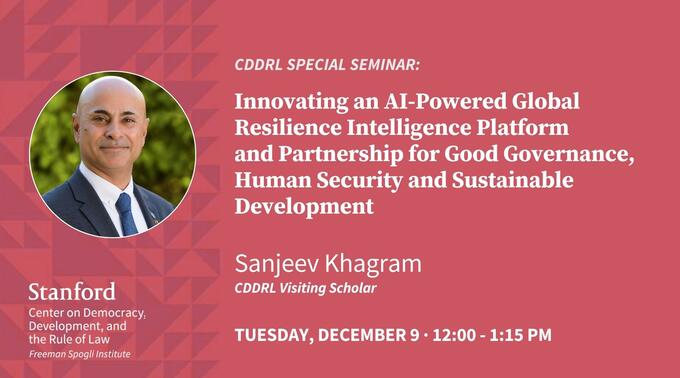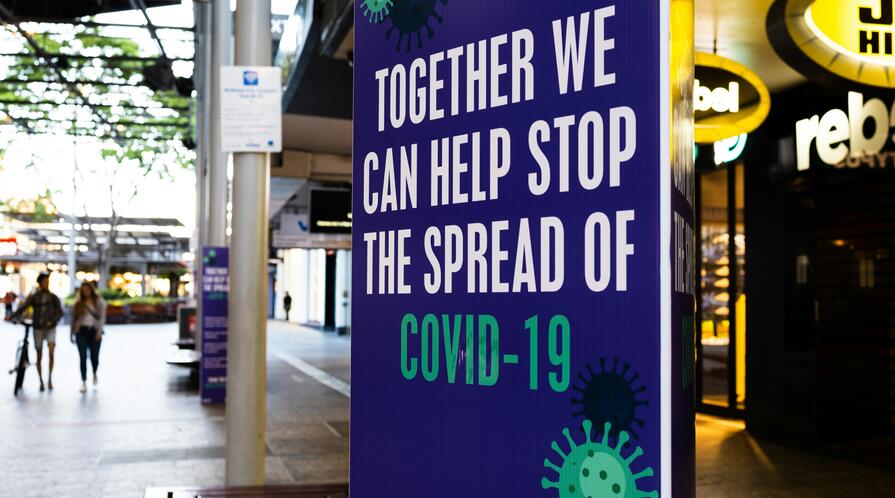Sanjeev Khagram — Innovating an AI-Powered Global Resilience Intelligence Platform and Partnership (GRIPP) for Good Governance, Human Security, and Sustainable Development

This seminar will introduce the prototype of an innovative new AI-powered decision-making intelligence platform that forecasts country trajectories with scenario analysis, predictive analytics, hotspot detection, causal explanations through large language models, etc., for a range of outcomes central to CDDRL and FSI's missions — effective governance, human security, and sustainable development. The initial use case is for political resilience and its inverse, fragility, conflict, and violence.
ABOUT THE SPEAKER
Dr. Sanjeev Khagram is a world-renowned leader, entrepreneur, scholar, and professor across the academic, private, public, and civic sectors. His specialities include global leadership and management across sectors, entrepreneurship and innovation, the data revolution and 4th Industrial Revolution — including AI, sustainable development and human security, good governance and accountability, globalization and transnationalism, public-private partnerships and multi-stakeholder networks. Dr. Khagram holds all of his transdisciplinary bachelor's, master's, and doctoral degrees from Stanford University. He has lived and worked for extended periods in Australia, Brazil, China, Kenya, India, Indonesia, Mexico, Nigeria, the GCC, Germany, South Africa, Thailand, and the United Kingdom.
Dr. Sanjeev Khagram is currently a Visiting Scholar at Stanford University’s Center for Democracy, Development and the Rule of Law and Department of Management Science and Engineering. He is also a Distinguished Visiting Fellow with the Hoover Institution's Emerging Markets Working Group, where he leads the Global Reslience Intelligence Platform Partnership (GRIPP), and at the Center for Sustainable Development and Global Competitiveness, where he leads the AI and Sustainability Initiative at Stanford.
Khagram was most recently CEO, Director-General, and Dean of the Thunderbird School of Global Management, 2018-2024, which he took to #1 in International Trade with QS World University Rankings. He is on leave from his position as Foundation Professor of Global Leadership and Global Futures at the Thunderbird School of Global Management, Arizona State University. Previously, he was the inaugural Young Professor of Global Political Economy at Occidental College, Wyss Scholar at the Harvard Business School, Founding Director of the Lindenberg Center for International Development, Professor at the University of Washington, and Associate Professor at Harvard’s Kennedy School of Government.
Dr. Khagram is an award-winning scholar and teacher. Dr. Khagram has published widely including the award winning book Dams and Development with Cornell University Press; Restructuring World Politics with University of Minnesota Press; The Transnational Studies Reader with Routledge Press; Open Budgets: The Political Economy of Transparency, Participation and Accountability with Brookings Press; "Inequality and Corruption" in the American Journal of Sociology; "Future Architectures of Global Governance" in Global Governance, "Environment and Security" in the Annual Review of Environment and Resources, “Towards a Platinum Standard for Evidence-Based Assessment,” in Public Administration Review, “Social Balance Sheets” in Harvard Business Review, “Evidence for Development Effectiveness” in the Journal of Development Effectiveness, and “From Human Security and the Environment to Sustainable Security and Development,” in the Journal of Human Development.
Dr. Khagram has worked extensively in global leadership roles across international organizations, government, business, and civil society from the local to the international levels around the world. Dr. Khagram has established and led a range of global multi-stakeholder initiatives over the last three decades, including the Global Carbon Removal Partnership, Global Partnership for Sustainable Development Data, the Global Initiative for Fiscal Transparency, and the World Commission on Dams, authoring its widely acclaimed final report.
Dr. Khagram was selected as a Young Global Leader at the World Economic Forum, was a senior advisor to United Nations Secretary General Ban Ki-Moon, Dean of the Desmond Tutu Peace Centre, and Founder/CEO of Innovations for Scaling Impact – a global technology enterprise solutions network. He is currently Chair of the Board of United Platform Solutions (an African AI-IOT Pollution Monitoring Venture) and Vice Chair of Altos Bank (the first new bank in Silicon Valley since 2008).
Dr. Khagram was born in Uganda as a fourth-generation East African Indian. He and his family were expelled by Idi Amin and spent several years in refugee camps before being provided asylum in the United States in the 1970s. He has lived and worked across all regions of the world and travelled to over 140 countries.
Virtual to Public. If prompted for a password, use: 123456
Only those with an active Stanford ID with access to Philippines Conference Room in Encina Hall may attend in person.
Sanjeev Khagram
Dr. Sanjeev Khagram is a world-renowned leader, entrepreneur, scholar, and professor across the academic, private, public, and civic sectors. His specialities include global leadership and management across sectors, entrepreneurship and innovation, the data revolution and 4th Industrial Revolution — including AI, sustainable development and human security, good governance and accountability, globalization and transnationalism, public-private partnerships and multi-stakeholder networks. Dr. Khagram holds all of his transdisciplinary bachelor's, master's, and doctoral degrees from Stanford University. He has lived and worked for extended periods in Australia, Brazil, China, Kenya, India, Indonesia, Mexico, Nigeria, the GCC, Germany, South Africa, Thailand, and the United Kingdom.
Dr. Sanjeev Khagram is currently a Visiting Scholar at Stanford University’s Center for Democracy, Development and the Rule of Law and Department of Management Science and Engineering. He is also a Distinguished Visiting Fellow with the Hoover Institution's Emerging Markets Working Group, where he leads the Global Reslience Intelligence Platform Partnership (GRIPP), and at the Center for Sustainable Development and Global Competitiveness, where he leads the AI and Sustainability Initiative at Stanford.
Khagram was most recently CEO, Director-General, and Dean of the Thunderbird School of Global Management, 2018-2024, which he took to #1 in International Trade with QS World University Rankings. He is on leave from his position as Foundation Professor of Global Leadership and Global Futures at the Thunderbird School of Global Management, Arizona State University. Previously, he was the inaugural Young Professor of Global Political Economy at Occidental College, Wyss Scholar at the Harvard Business School, Founding Director of the Lindenberg Center for International Development, Professor at the University of Washington, and Associate Professor at Harvard’s Kennedy School of Government.
Dr. Khagram is an award-winning scholar and teacher. Dr. Khagram has published widely including the award winning book Dams and Development with Cornell University Press; Restructuring World Politics with University of Minnesota Press; The Transnational Studies Reader with Routledge Press; Open Budgets: The Political Economy of Transparency, Participation and Accountability with Brookings Press; "Inequality and Corruption" in the American Journal of Sociology; "Future Architectures of Global Governance" in Global Governance, "Environment and Security" in the Annual Review of Environment and Resources, “Towards a Platinum Standard for Evidence-Based Assessment,” in Public Administration Review, “Social Balance Sheets” in Harvard Business Review, “Evidence for Development Effectiveness” in the Journal of Development Effectiveness, and “From Human Security and the Environment to Sustainable Security and Development,” in the Journal of Human Development.
Dr. Khagram has worked extensively in global leadership roles across international organizations, government, business, and civil society from the local to the international levels around the world. Dr. Khagram has established and led a range of global multi-stakeholder initiatives over the last three decades, including the Global Carbon Removal Partnership, Global Partnership for Sustainable Development Data, the Global Initiative for Fiscal Transparency, and the World Commission on Dams, authoring its widely acclaimed final report.
Dr. Khagram was selected as a Young Global Leader at the World Economic Forum, was a senior advisor to United Nations Secretary General Ban Ki-Moon, Dean of the Desmond Tutu Peace Centre, and Founder/CEO of Innovations for Scaling Impact – a global technology enterprise solutions network. He is currently Chair of the Board of United Platform Solutions (an African AI-IOT Pollution Monitoring Venture) and Vice Chair of Altos Bank (the first new bank in Silicon Valley since 2008).
Dr. Khagram was born in Uganda as a fourth-generation East African Indian. He and his family were expelled by Idi Amin and spent several years in refugee camps before being provided asylum in the United States in the 1970s. He has lived and worked across all regions of the world and travelled to over 140 countries.








